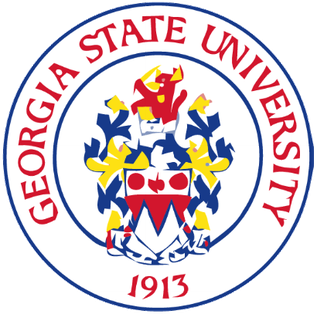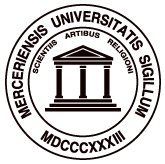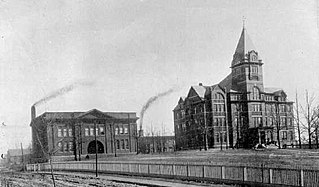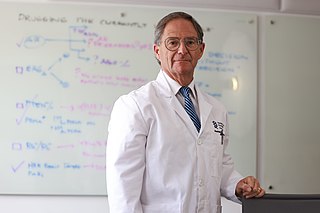Related Research Articles

Atlanta is the capital and most populous city in the U.S. state of Georgia. It is the seat of Fulton County, and a portion of the city extends into neighboring DeKalb County. With a population of 510,823 living within the city limits, Atlanta is the eighth most populous city in the Southeast and 38th most populous city in the United States according to the 2020 U.S. census. It is the principal city of the much larger Atlanta metropolitan area, the core of which includes Cobb, Clayton and Gwinnett counties, in addition to Fulton and DeKalb. Metro Atlanta is home to more than 6.3 million people, making it the sixth-largest U.S. metropolitan area. Situated among the foothills of the Appalachian Mountains at an elevation of just over 1,000 feet (300 m) above sea level, Atlanta features unique topography that includes rolling hills, lush greenery, and the densest urban tree coverage of any major city in the United States.

Emory University is a private research university in Atlanta, Georgia, United States. It was founded in 1836 as Emory College by the Methodist Episcopal Church and named in honor of Methodist bishop John Emory. Its main campus is in the Druid Hills neighborhood, three miles from downtown Atlanta.

The 1996 Summer Olympics were an international multi-sport event held from July 19 to August 4, 1996, in Atlanta, Georgia, United States. These were the fourth Summer Olympics to be hosted by the United States, making it the first country to have three different cities host the Summer Olympics. It also marked the 100th anniversary of the 1896 Summer Olympics in Athens, the inaugural edition of the modern Olympic Games. These were also the first Summer Olympics to be held in a different year than the Winter Olympics since the Winter Olympics commenced in 1924, as part of a new IOC practice implemented in 1994 to hold the Summer and Winter Games in alternating, even-numbered years. The 1996 Games were the first of the two consecutive Summer Olympics to be held in a predominantly English-speaking country, preceding the 2000 Summer Olympics in Sydney, Australia. These were also the last Summer Olympics to be held in North America until 2028, when Los Angeles will host the games for the third time.
Historically black colleges and universities (HBCUs) are institutions of higher education in the United States that were established before the Civil Rights Act of 1964 with the intention of primarily serving African Americans. Most of these institutions were founded during the Reconstruction era after the Civil War and are concentrated in the Southern United States. They were primarily founded by Protestant religious groups, until the Second Morill Act of 1890 required educationally segregated states to provide African American, public higher-education schools in order to receive the Act's benefits.

Spelman College is a private, historically Black, women's liberal arts college in Atlanta, Georgia. It is a founding member of the Atlanta University Center academic consortium. Founded in 1881 as the Atlanta Baptist Female Seminary, Spelman awarded its first college degrees in 1901 and is the oldest private historically Black liberal arts institution for women.

The University of Georgia is a public land-grant research university with its main campus in Athens, Georgia, United States. Chartered in 1785, it is the oldest public university in the United States. It is the flagship school of the University System of Georgia.

Georgia State University is a public research university in Atlanta, Georgia, United States. Founded in 1913, it is one of the University System of Georgia's four research universities. It is also the largest institution of higher education by enrollment based in Georgia and one of the largest in the nation with a student enrollment of around 50,000, including approximately 33,000 undergraduate and graduate students at the main campus downtown.

Louis Wade Sullivan is an active health policy leader, minority health advocate, author, physician, and educator. He served as the Secretary of the United States Department of Health and Human Services during President George H. W. Bush's Administration and was Founding Dean of the Morehouse School of Medicine.

The University System of Georgia (USG) is the government agency that includes 26 public institutions of higher learning in the U.S. state of Georgia. The system is governed by the Georgia Board of Regents. It sets goals and dictates general policy to educational institutions as well as administering the Public Library Service of the state which includes 58 public library systems. The USG also dispenses public funds to the institutions but not the lottery-funded HOPE Scholarship. The USG is the sixth largest university system in the United States by total student enrollment, with 344,392 students in 26 public institutions as of 2023. USG institutions are divided into four categories: research universities, regional comprehensive universities, state universities, and state colleges.

Buckhead Village is a neighborhood of Atlanta, Georgia, one of 42 neighborhoods in the larger Buckhead district and the community's historic business section. The Village as defined by the city as the area between Piedmont Road, Peachtree Road, and Pharr Road.

Mercer University is a private research university with its main campus in Macon, Georgia. Founded in 1833 as Mercer Institute and gaining university status in 1837, it is the oldest private university in the state and enrolls more than 9,000 students in 12 colleges and schools. Mercer is a member of the Georgia Research Alliance. It is classified as a "R2: Doctoral Universities — High research activity".
An urban debate league (UDL) is a group of high school policy debate teams from urban high schools in the United States. UDLs are generally located in large cities throughout the United States and work predominantly with minority students.

Michael Lucius Lomax is an American educator and former elected official who has served as president and chief executive officer of the United Negro College Fund since 2004. From 1997 to 2004, he served as president of Dillard University, a historically Black university (HBCU). Lomax was elected as a member and then chairman of the Fulton County Board of Commissioners, the first African American elected official in history to lead a major county government in the State of Georgia.

Samuel Zamarripa is an American entrepreneur, author, and former politician. He is currently the Proprietor of Doghobble Vineyard and Farm in Dahlonega, Georgia. He served as the CEO of Intent Solutions in Atlanta, Georgia from 2017 - 2021. In 2018, Zamarripa lead the acquisition of Mundo Hispanico from the Cox Media Group and now serves as its Chairman of the media enterprise.

The history of the Georgia Institute of Technology can be traced back to Reconstruction-era plans to develop the industrial base of the Southern United States. Founded on October 13, 1885, in Atlanta as the Georgia School of Technology, the university opened in 1888 after the construction of Tech Tower and a shop building and only offered one degree in mechanical engineering. By 1901, degrees in electrical, civil, textile, and chemical engineering were also offered. In 1948, the name was changed to the Georgia Institute of Technology to reflect its evolution from an engineering school to a full technical institute and research university.

The Georgia Department of Economic Development (GDEcD) is a department of the state of Georgia, United States. The GDEcD is responsible for managing resources to attract new business investments to Georgia, expand Georgia's existing industries and businesses, locate new markets for Georgian products, and promote and fund entertainment projects produced in the state.

Jonathan W. Simons is an American physician-scientist, medical oncologist, and leader in prostate cancer research. In August 2021, Simons was appointed the medical director and Chief Science Officer of the Marcus Foundation. Prior to joining the Marcus Foundation, he served a 14-year tenure as the President and chief executive officer of the Prostate Cancer Foundation. Simons’ laboratories, partly funded by the Prostate Cancer Foundation, at Johns Hopkins University and Emory University made original contributions to understanding the molecular biology of prostate cancer metastasis and principles of “broken immune tolerance” via T cell based immunotherapy for prostate cancer. The Simons lab invented GM-CSF genetically engineered vaccines for prostate cancer in rodents and humans for these studies, and subsequently Simons’ clinical team took the biotechnology into the world’s first human gene therapy clinical trials for advanced prostate cancer at Johns Hopkins.

The Rufus M. Rose House is a late Victorian, Queen Anne style house located in the SoNo district of Atlanta, Georgia. Occupying a narrow lot on Peachtree Street, one and a half blocks south of North Avenue, the house was built in 1901 for Dr. Rufus Mathewson Rose. The architect was Emil Charles Seiz (1873–1940), who designed many residential and commercial structures in the city, including the 1924 Massellton Apartments on Ponce de Leon Avenue.
Walter "Wally" J. Curran, Jr. is an American radiation oncologist specializing in the treatment of malignant brain tumors and locally advanced lung cancer.